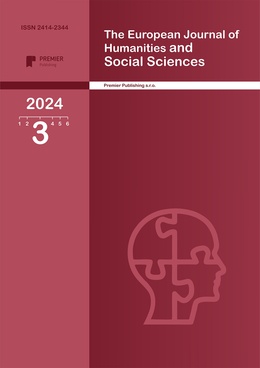An Exploration of Turn-Taking Strategies and the Reflection of Politeness Principle in Interview Programs - Taking Taylor Swift’s Guest on Late Night with Seth Meyers as an Example
Authors
Ying Wu

Share
Annotation
This paper presents an exploration of turn-taking strategies and their reflection of the politeness principle in interview programs. Conversations, while appearing effortless, require coordination of multiple cognitive processes, including turn-taking. Turn-taking, an integral part of any multi-party conversation, can be impolite when inappropriate. Drawing from previous research on turn-taking and the prisoner's dilemma, this study examines the strategies employed by guests and hosts in reality talk shows, particularly focusing on how these strategies reflect the Politeness Principle. This research analyzes the specific turn-taking strategies and their politeness implications. The findings contribute to a deeper understanding of turn-taking in interview settings and their significance in maintaining politeness and effective communication. This study offers insights for future research on conversational strategies and their role in interpersonal communication.
Keywords
Authors
Ying Wu

Share
References:
Hugh Sibly, John Tisdell, Cooperation and turn taking in finitely-repeated prisoners’ dilemmas: An experimental analysis, Journal of Economic Psychology,Volume 64, 2018, Pages 49-56
Leech, G. N. Principles of Pragmatics.London and New York:Longman. 1983.
Pablo Brusco, Agustín Gravano, Automatic offline annotation of turn-taking transitions in task-oriented dialogue, Computer Speech & Language,Volume 78,2023
Sacks H.A Simplest Systematics for Turn-Taking for Conversation[J]. Language, 1974.
Sacks, H. 1992. Lectures on Conversation: VolumesⅠand Ⅱ. Malden, Massachusetts: Blackwell.
Sara Bögels, Neural correlates of turn-taking in the wild: Response planning starts early in free interviews, Cognition, Volume 203, 2020,104347
Vladimiro Lourenço, Juliana Serra, Joana Coutinho, Alfredo F. Pereira, Turn-taking in free-play interactions: A cross-sectional study from 3 to 5 years,Cognition, Volume 239, 2023, 105568, ISSN 0010-0277
Yule, G. 2000. Pragmatics. Oxford: Oxford University Press.
何山燕.留学生汉语口语话轮转换研究[J].广西民族大学学报(哲学社会科学版),2010,32(02):175-177.
何自然, 冉永平. 新编语用学概论[M]. 第一版. 北京大学出版社, 2010 :101-104.
黄蕾.英语跨代对话话轮转换标记语研究——以美国情景剧《成长的烦恼》为例[J].西南民族大学学报(人文社会科学版),2010,31(S1):231-233.
李海燕,于金刚.从话轮转换看《末路狂花》中塞尔玛的成长历程[J].电影文学,2011(18):97-99.
邱梦颖.三方互动中的打断与话轮转换——以《健康之路》为例[J].西安外国语大学学报,2016,24(01):54-58.DOI:10.16362/j.cnki.cn61-1457/h.2016.01.013.
桑玉萍.从话轮转换看《克莱默夫妇》中的父子关系[J].电影文学,2010(22):85-86.
易秀清,王小亮.话轮转换视角下的动态权势关系和人物性格——以《印度之行》某一冲突性话语片段为例[J].西南交通大学学报(社会科学版),2010,11(04):36-41.
张志宏,魏振泰.话轮转换下的《蛙》中陈鼻性格特征及变化研究[J].天津大学学报(社会科学版),2016,18(04):367-372.
赵利.社会语言学视角下的话轮转换——以《呼啸山庄》为例[J].语文建设,2016(15):41-42.DOI:10.16412/j.cnki.1001-8476.2016.15.021.
周银凤.从话轮转换角度解析电影《死亡诗社》中尼尔的悲惨结局[J].电影文学,2011(20):86-8


